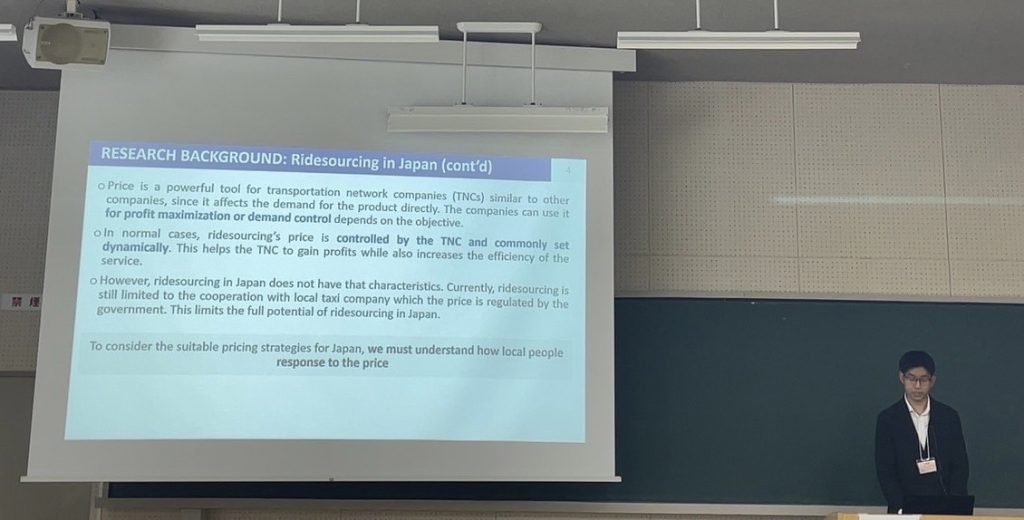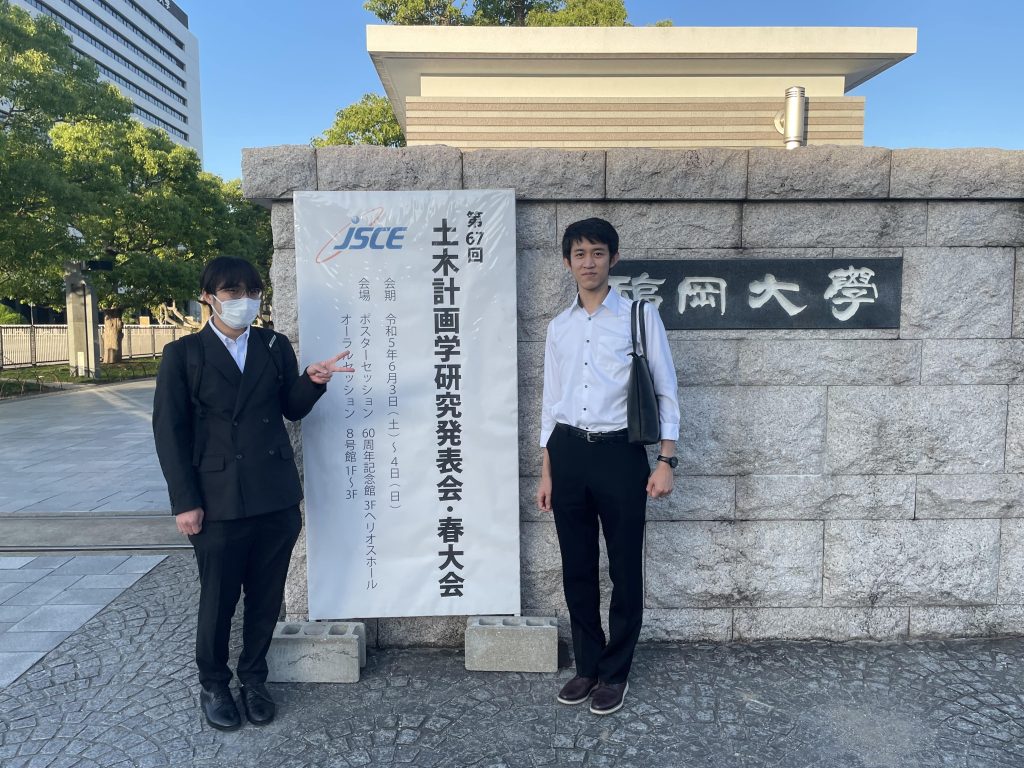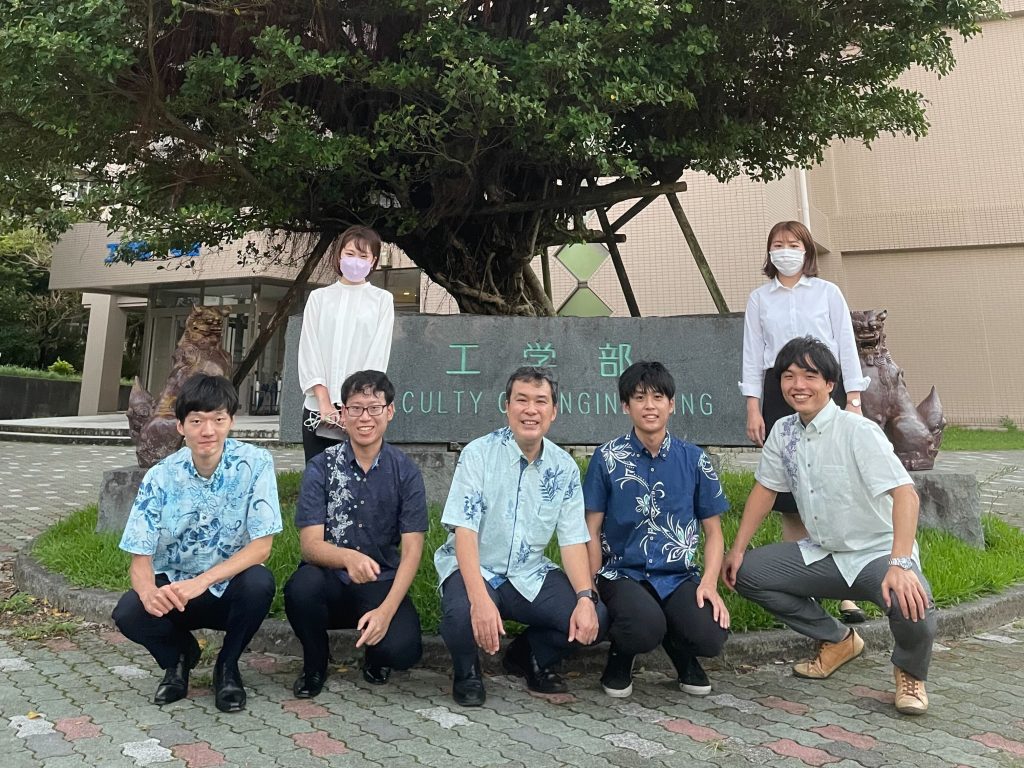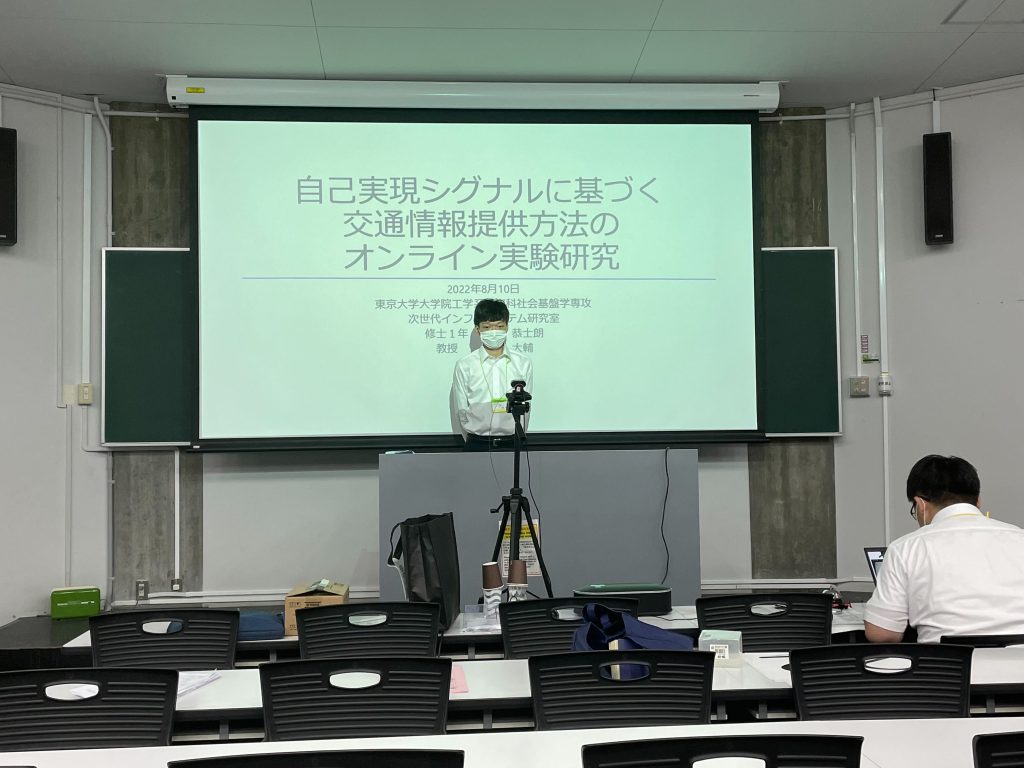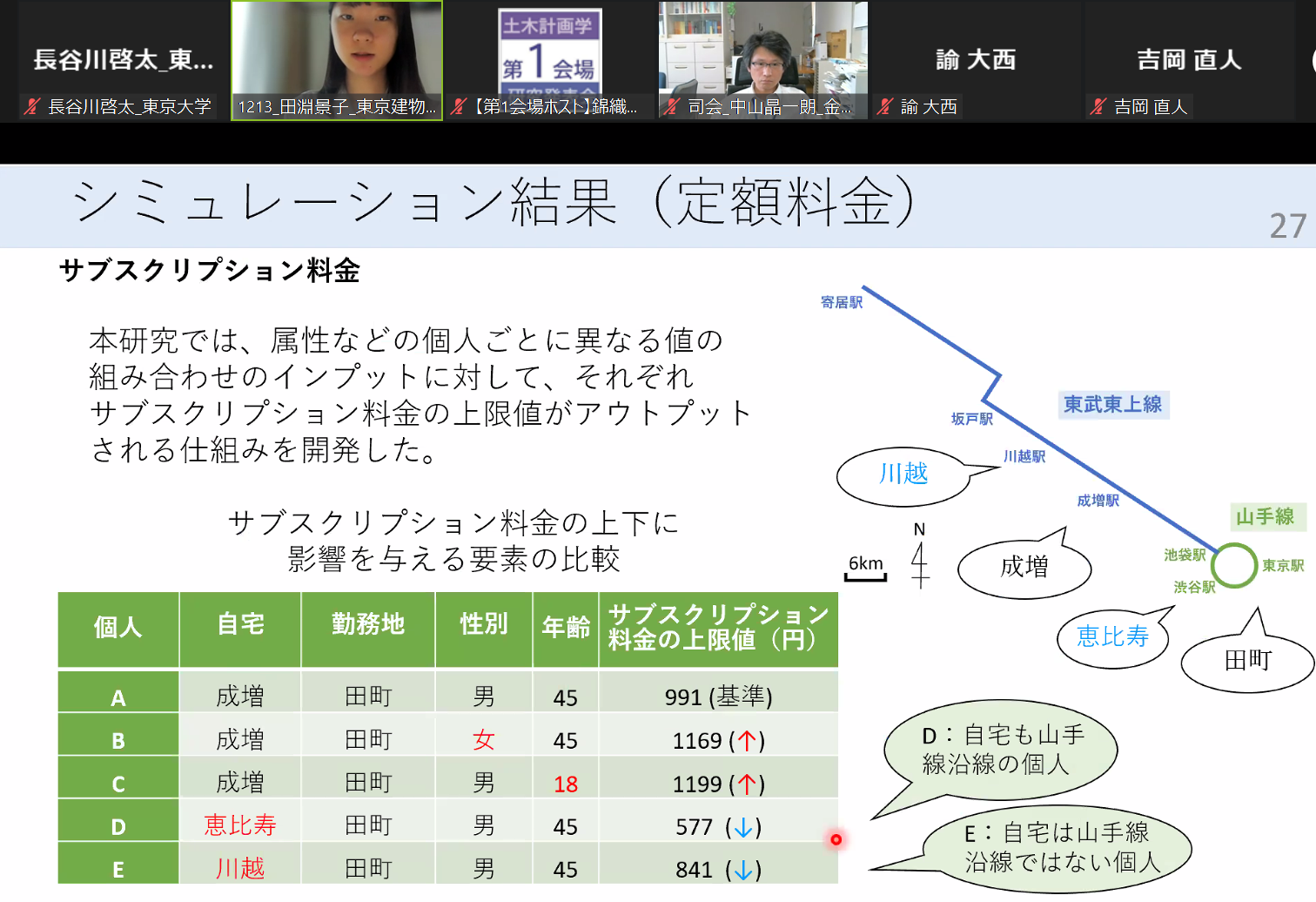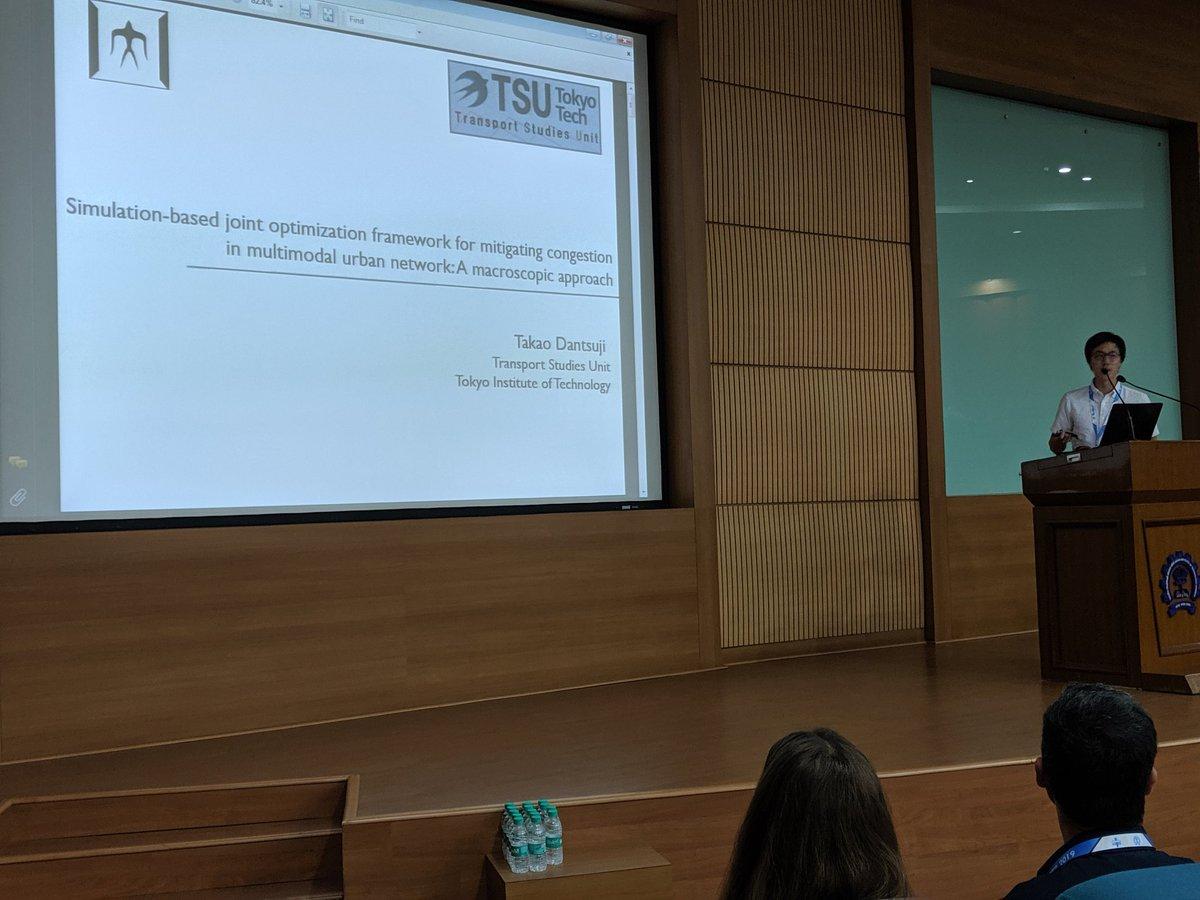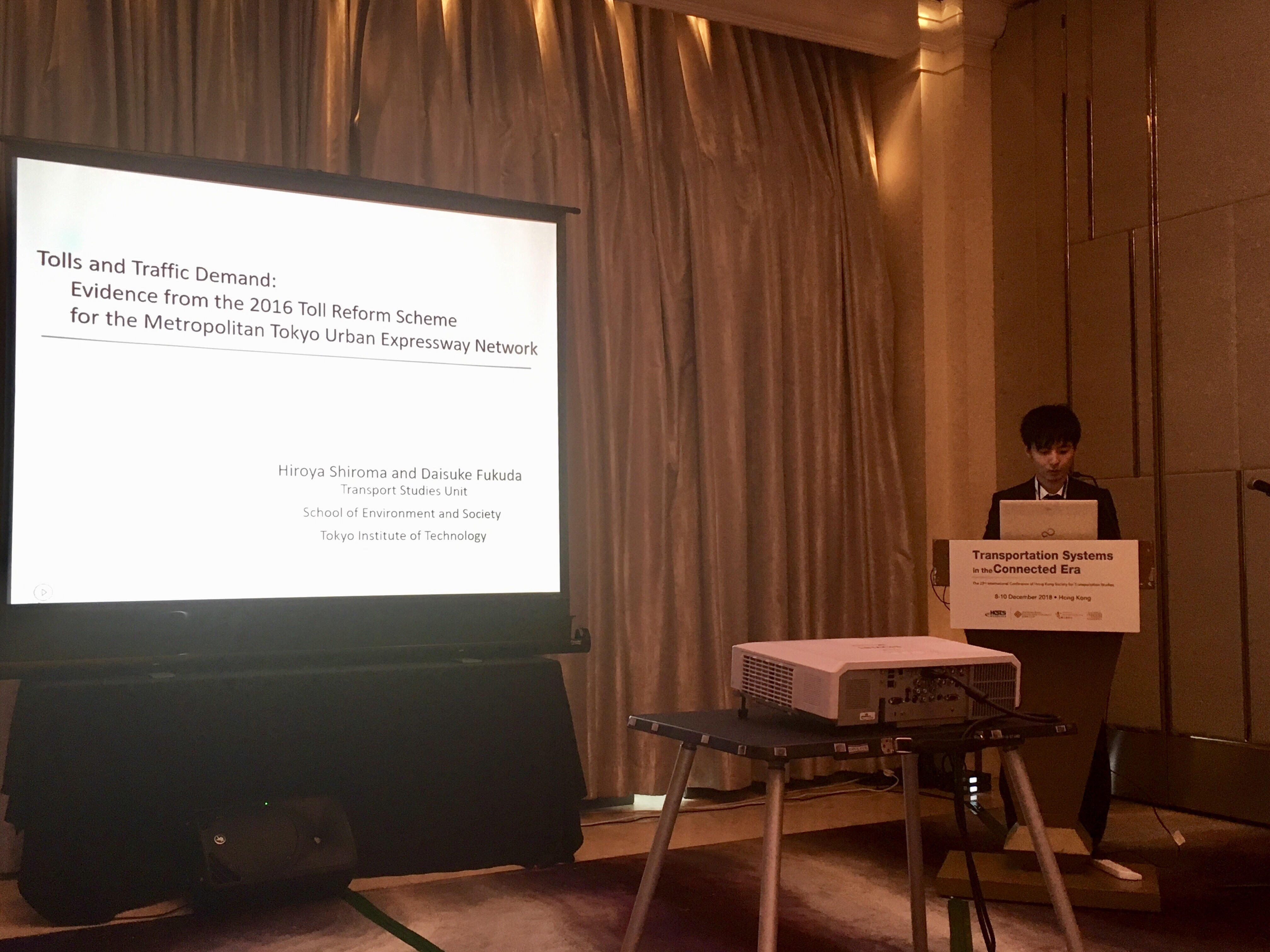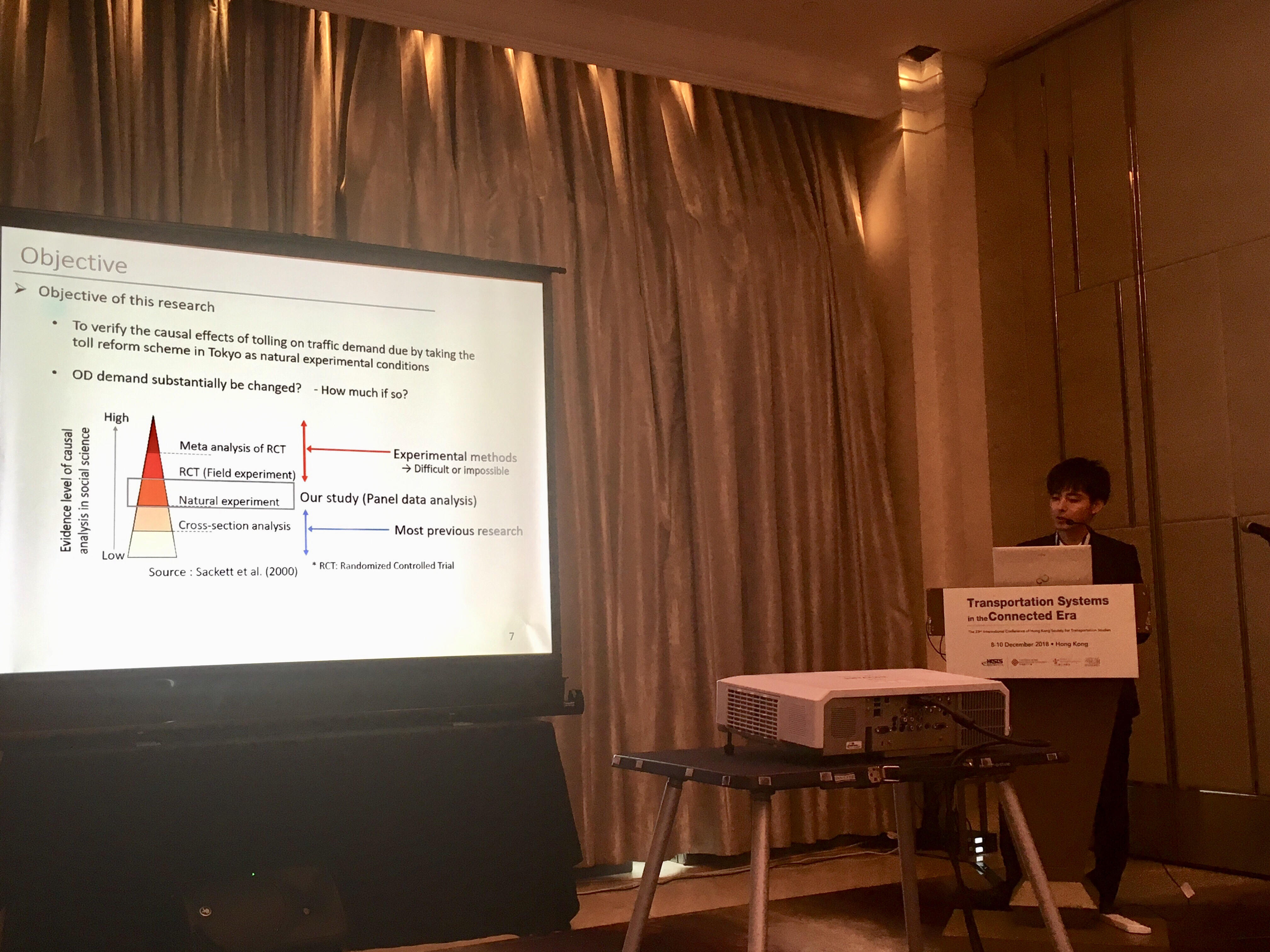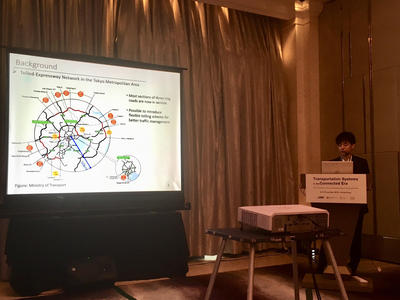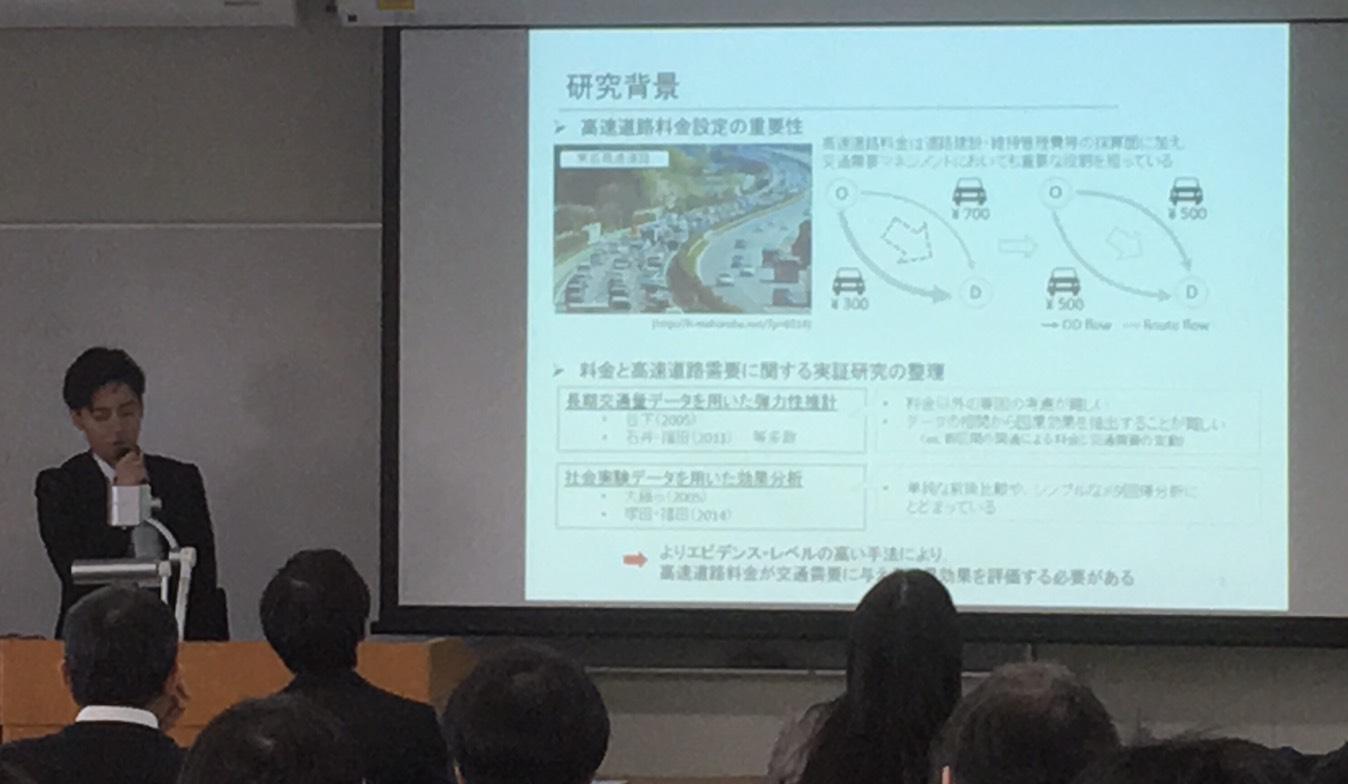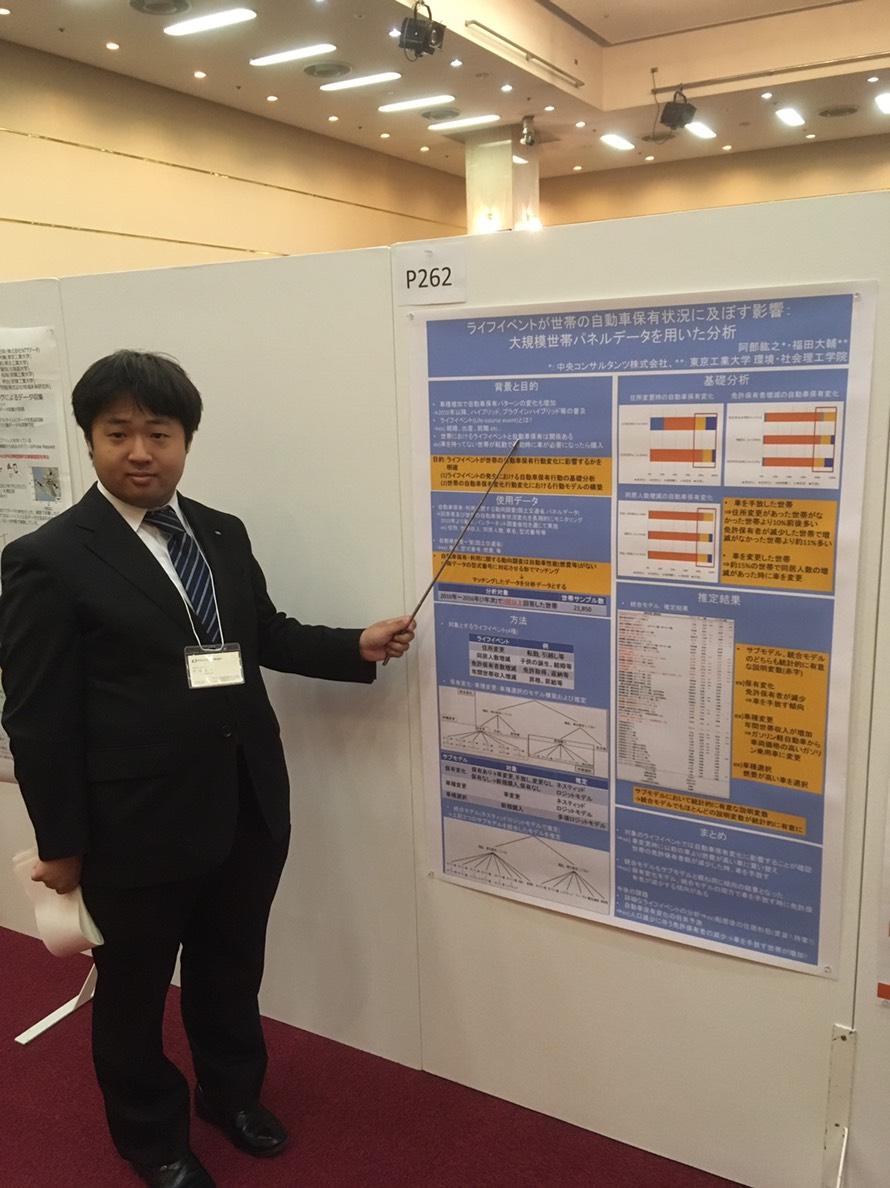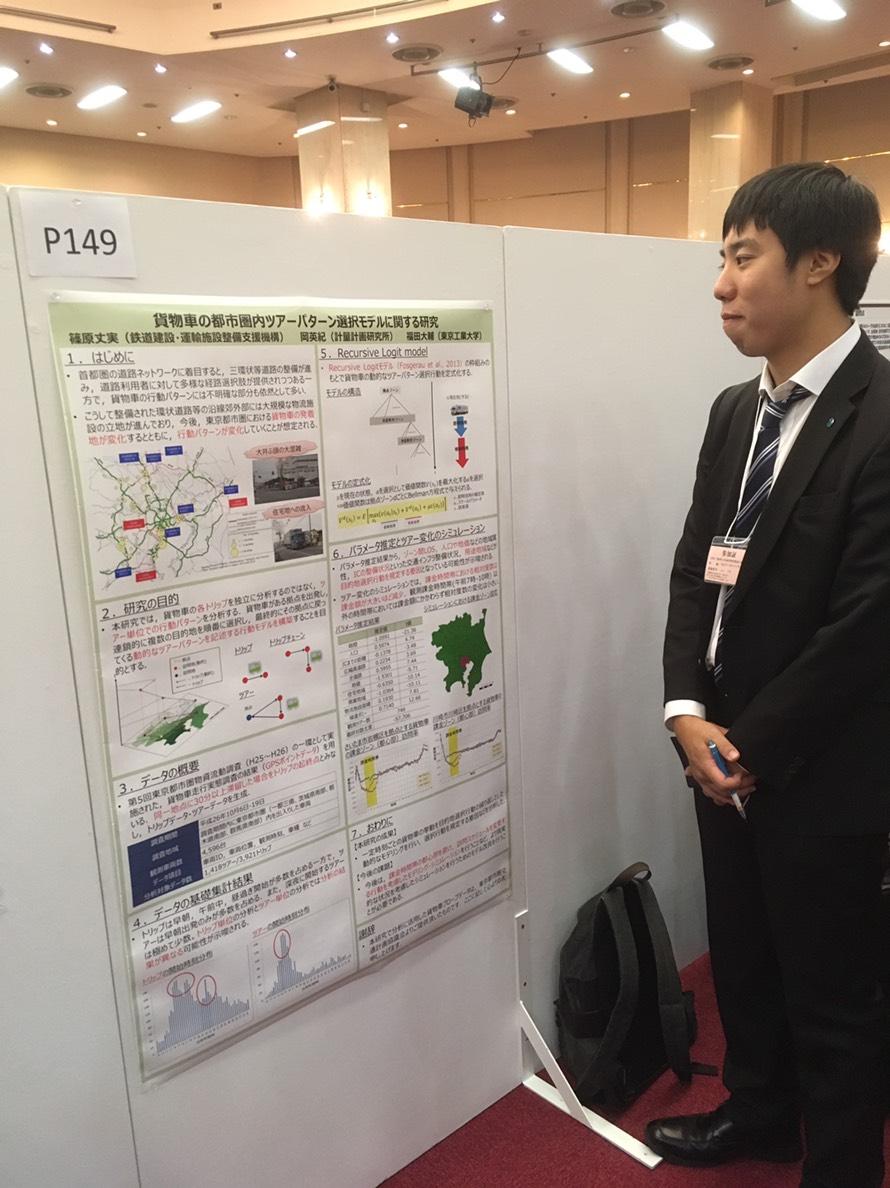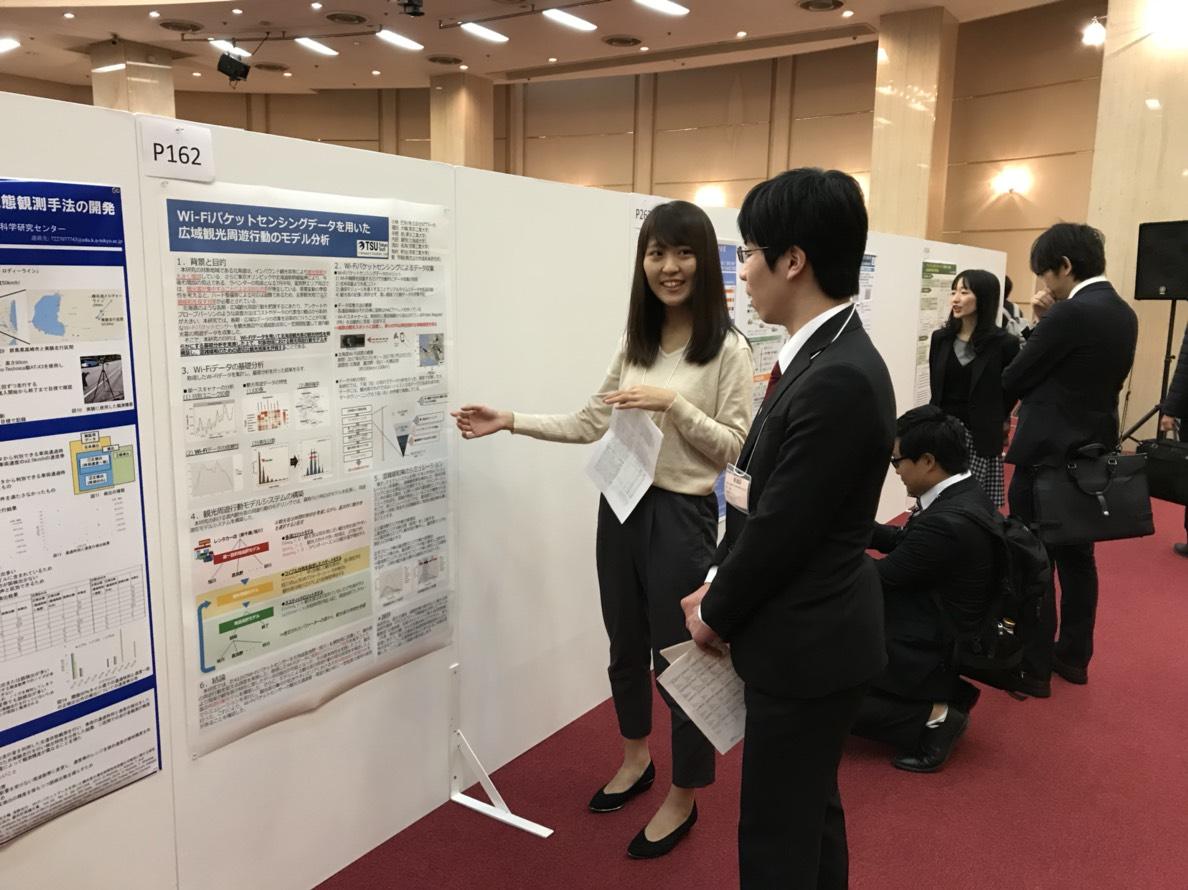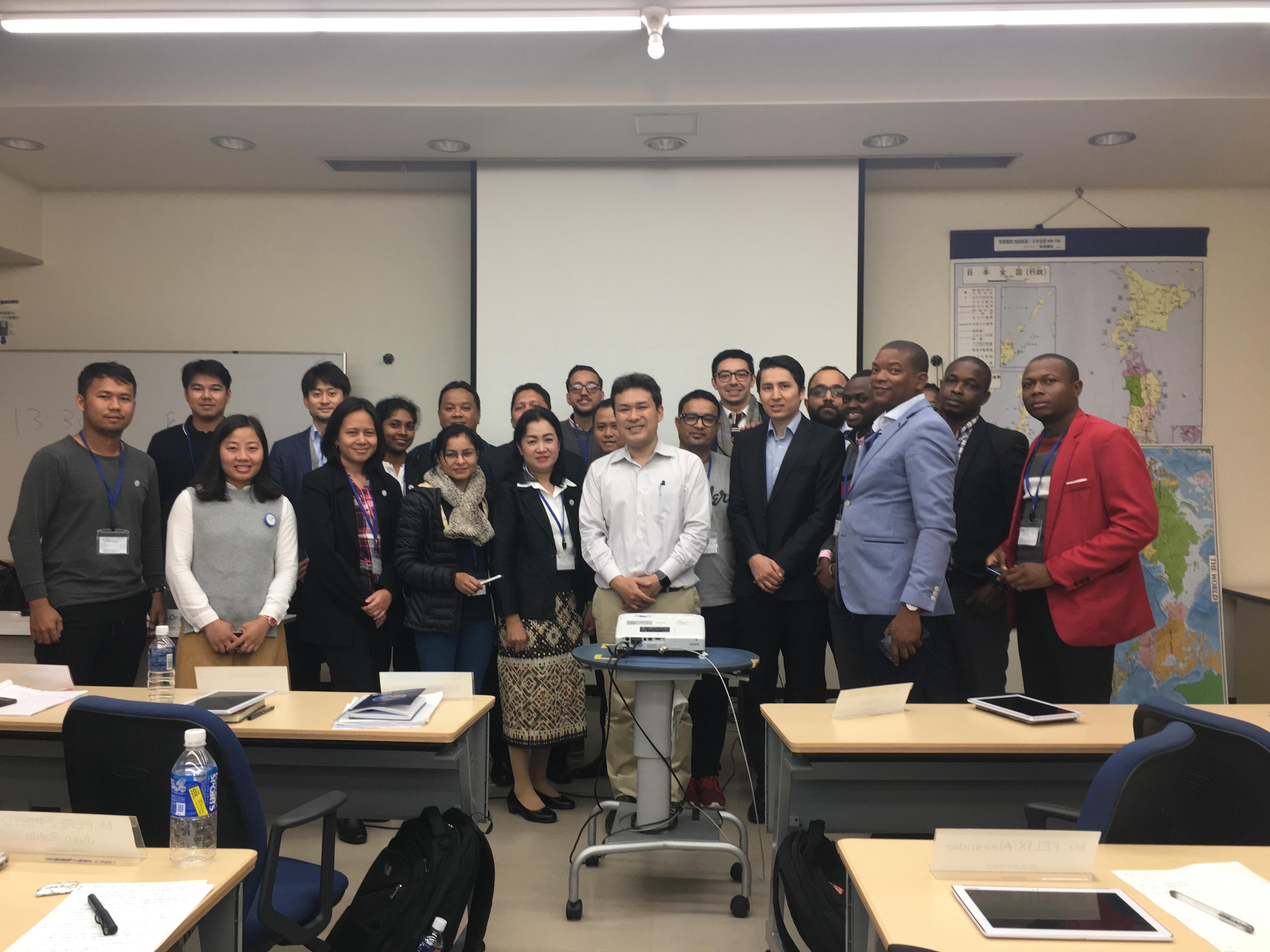JSCE Spring Conference @ Fukuoka University
[3-4 June, 2023]
Mr. Krittnai presented his research at the Spring Conference of the JSCE Committee of Infrastructure Planning and Management, which was held at Fukuoka University on 3rd (Saturday) and 4th (Sunday) June. The title of his presentation was as follows:
“How Does Price Affect the Utilization of Ridesourcing Services: Evidence from Uber Japan’s Experiments (Sriwongphanawes Krittanai and Daisuke Fukuda)”
We received valuable comments regarding Mr. Krittanai’s presentation from many professors and participants. Thus, we would like to take this opportunity to express our gratitude.
Moreover, we also participated in the conference as audiences. Over these two days, presentations from various fields were held. We had the chance to know some interesting research conducted by students from other universities with whom we have been involved in previous research activities, especially during the poster session! This experience provided us with great inspiration for our future master’s research. We are grateful to participate in this conference!
| Conferences Lab Life by Students
JSCE Committee of Infrastructure Planning and Management @ University of the Ryukyus
[11 – 13 November, 2022]
Mr. Ukai, an alumnus from our lab, presented his paper at the Fall Conference of the JSCE Committee of Infrastructure Planning and Management, which was held at the University of the Ryukyus from 11st (Friday) to 13rd (Sunday) November. The title of his presentation is as follows:
Information Design Based Transportation Management: A Fundamental Study under Fluctuating Demand
(Kenta Ukai and Daisuke Fukuda)
Moreover, six Japanese students from our lab participated in the conference as assistants. We mainly acted as a timekeeper at the presentation venue, and were able to listen to various research presentations, ranging from areas close to my own research to areas I had never touched before (of course, the role of timekeeper took precedence). Furthermore, I had a chance to meet many people who helped me during my visit to Kanazawa in the summer, and I was able to spend a very enriching time there.
In addition, through this opportunity, I was able to deepen my friendship with the student members of Kamiya Laboratory. I would like to take this opportunity to thank Prof. Kamiya and everyone at the University of the Ryukyus for this valuable opportunity. Let’s keep in touch and inspire each other in the future!
[Hasegawa]
| Conferences Lab Life by Students
Research Presentations at Japan Society of Traffic Engineers (JSTE)
[9-10 August 2022]
On 9 and 10 August, Mr. Ebashi (M1) and Mr. Sakurai (OB) presented their research at Japan Society of Traffic Engineers (JSTE), which was held at the Waseda Campus, Waseda University. Their research titles are shown as follows:
Analysis of the impact of introducing congestion charging to tourist attractions on excursion tourism behavior. [観光地への混雑課金導入が周遊行動に与える影響への分析]
(Rikuto Sakurai, Natsuho Iokura, & Daisuke Fukuda)
Online experimental study of a traffic information provision method based on self-fulfilling signals. [自己実現シグナルに基づく交通情報提供方法のオンライン実験研究]
(Kyoshiro Ebashi & Daisuke Fukuda)
We have received many useful comments on each presentation from Prof. Muromachi of Tokyo Institute of Technology and others. Here, we would like to take this opportunity to express our gratitude towards them.
[Ebashi]
| Conferences Lab Life by Students
Comittee of Infrastructure Planning and Managemant
[June 4 – 5, 2022]
M1 Hasegawa, OG Tabuchi, and OB Kimura presented their papers at the Comittee of Infrastructure Planning and Managemant held online on June 4 (Sat.) and 5 (Sun.). The titles of their presentations are as follows.
Time-of-day Charging Simulation of Urban Railways Based on Structural Changes in Demand
(Comet Kimura and Daisuke Fukuda)
Ex-post Evaluation of Recent Inter-regional Allocation Policies in Japan: A QSE Approach
(Keita Hasegawa and Daisuke Fukuda)
The Impact of Urban MaaS Introduction on Lifestyle Behavior and Evaluation of Subscription Plans: A Simulation Analysis in the Tokyo Metropolitan Area
(Keiko Tabuchi and Daisuke Fukuda)
Other presentations related to Dr. Fukuda’s work were as follows
Development of the Activity Simulator “Tokyo Metropolitan Area ACT” and its Application to the Study of Urban Transportation Policies
(Ryoji Ishii, Daisuke Fukuda, Hideki Yanaginuma, Takahiko Kusakabe, Wataru Mogi, Koshi Isono, Takeshi Shibukawa, Hirotsugu Suenari, Ryuta Nishi, Shota Ito)
Fusion Method of Activity Simulation and Observation Data in Tokyo Metropolitan Area
(Akane Komiyama, Kuniaki Sasaki, Daisuke Fukuda, Ryoji Ishii)
Individual Activity Estimation Using Activity Simulator and Cell Phone Base Station Data -Assessing the Applicability to the Corona Disaster
(Ryoji Ishii, Kuniaki Sasaki, Daisuke Fukuda, Yuhan Gao, Akane Komiyama)
Dr. Takayama of Kanazawa University, Dr. Okuda of Nanzan University, and Dr. Kono of Tohoku University gave us advices on the improvement of the model and the direction of future application of the model. All of their comments were very helpful for the submission of the paper. I would like to take this opportunity to thank them.
[Hasegawa]
| Conferences Lab Life by Students
World Conference on Transport Research Society (Mr. Dantsuji)
[26 May 2019]
Mr. Dantsuji (D3) from our lab gave a speech at the World Conference on Transport Research Society (WCTRS), which was held in Mumbai, India.
In his presentation titled “Simulation-based joint optimization framework for mitigating congestion in multimodal urban network: A macroscopic approach”, he adopted a simulation-based optimization method for traffic demand management using 3D-MFD.
We have received many useful comments regarding the optimization algorithm and transportation network. Here, we would like to take this opportunity to express our gratitude towards them.
| Conferences Lab Life by Students
Hong Kong Society for Transportation Studies (HKSTS)
[8-10 December 2018]
At the 23rd Annual Conference of the Hong Kong Society for Transportation Studies (HKSTS) held on December 8th to 10th, Mr. Shiroma (M1) presented his research on causal effect analysis of the Metropolitan Tokyo expressway toll reform scheme, “Tolls and Traffic Demand: Evidence from the 2016 Toll Reform Scheme for the Metropolitan Tokyo Urban Expressway Network”. We have received comments from Dr. William Lam of the Hong Kong Polytechnic University and others on the estimation of elasticities and other issues. We would like to take this opportunity to express our gratitude towards them.
Applied Regional Science Conference (ARSC2018)@Nagoya
[2 December 2018]
Mr. Dantsuji (D3) made a presentation at the Applied Regional Science Conference (ARSC), which was held at Nanzan University in Nagoya on December 2nd and 3rd.
In his presentation titled “Departure Time and Mode Choice in Urban Cities with Bottleneck Congestion and Crowding Cost”, he analyzed the effects of fare policy by constructing a model for simultaneous choice of transportation modes and departure times that considering hypercongestion in the road network and in-train congestion on railroads.
Prof. Takayama of Kanazawa University and Prof. Fumi of Kyoto University provided us with very useful comments on the analyses of equilibrium, fare policies, and comparison with real-world observation. Furthermore, Prof. Takayama graciously agreed to be a discussant. We would like to take this opportunity to express our gratitude towards him.
Autumn Conference on Infrastructure Planning and Management @ Oita
[23-25 November 2018]
The 58th Autumn Conference on Infrastructure Planning and Management was held at Oita University from November 23rd to 25th. In our lab, Mr. Shiroma (M1) presented in the oral presentation category, and Mr. Abe (OB), Mr. Shinohara (OB) and Ms. Kobayashi (OG), alumni of our laboratory who graduated in 2018, presented in the poster session category. Ms. Kobayashi’s poster presentation was highly evaluated and she received the “Excellent Poster Award”. We would like to take this opportunity to those who provided comments at the conference.
For the research title, “Short-Term Impact Analysis of Expressway Toll Scheme in the Tokyo Metropolitan Area”, Mr. Shiroma (M1) examined the short-term impacts of new expressway toll scheme in the Tokyo Metropolitan Area (introduced in April 2016) on each OD pair trip traffic volume and route traffic volume. A causal effect analysis was adopted on the impact and a route choice model was constructed.
Moreover, under the research title, “Effects of Life Events on Household Car Ownership: Analysis Using Large Household Panel Data”, Mr. Abe constructed a discrete choice model of the effects of life events such as house moving, marriage, and childbirth on changes in household car ownership and vehicle type.
In addition, Mr. Shinohara presented his research title, “”A Study on Tour-Based Pattern Selection Model for Freight Vehicles within Urban Areas”. For his research, he constructed a tour-based pattern selection model on instead of a conventional trip-based model. He then conducted a simulation on the impact of the introduction of time-based pricing policy in urban areas on the tour patterns of freight vehicles.
Ms. Kobayashi’s research topic was “Model Analysis of Wide-Area Sightseeing Excursion Behavior Using Wi-Fi Packet Sensing Data”. She first constructed a sightseeing behavior model of tourists in Hokkaido by collecting data from Wi-Fi packet sensors, and then conducted a simulation of tourists’ choice of visiting places.
JICA Lecture
[19 November 2018]
The annual JICA lecture on “Urban Transport Planning” for transport practitioners in developing countries was held again. Prof. Fukuda lectured on the basics of traffic demand forecasting, including the four-step travel model, to an audience of about 20 students. Mr. Kaoru Yamada (Oriental Consultants Global Co., Ltd.), an alumnus of our lab, also attended the lecture as well.
National Conference of the City Planning Institute of Japan @Osaka
[18 November 2018]
Mr. Tsuru, an alumnus of our lab, presented the his master’s thesis at the 2018 National Conference of the City Planning Institute of Japan (CPIJ) that held from 16th to 18th November. He adopted an analytical model for predicting the number of newly established retail store locations and withdrawals in a provincial city on a detailed spatial basis. We would like to thank all the participants for their comments at his presentation. The content of his research has also been published as the following paper.
T., Tsuru, & D., Fukuda. (2018). Determinants of establishment and closing decisions for small retail stores in a provincial city. Journal of the City Planning Institute of Japan, 53(3), 1529-1536. (English version Japanese version)
The abstract of the paper is shown as follows.
The hollowing out of the central urban area in local cities is an urgent problem. In order to solve the problem, in local hub cities nationwide “Urban Facility Location Plan” is being planned and implemented. With this background, the objective of this study is to empirically and comprehensively reveal the factor that the retail store establish or close in local hub cities. For that, we construct a count data model that can predict the number of establishment and closing of retail stores in the detailed 1 km mesh level to analyze the impact of implementation of urban planning in detailed regional units. Based on the parameter estimation results, the size of the commercial area has a positive influence on the number of establishments, whereas it has a negative effect on the number of closings. The distance to the large shopping mall has negative effects on both the number of establishments and closings. We also find that in the central urban area the spatial effect parameter of the closing model tends to be positive suggesting that closing in neighboring areas may prompt closing in the current mesh. Finally, with the implementation of Urban Facility Location Plan in mind, we estimated the influence of induction of large commercial facilities to the central urban area on the number of locations and closings at retail stores.
